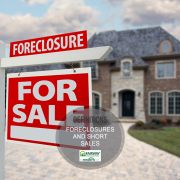The Difference Between a Short Sale and a Foreclosure
Short sales and foreclosures are both options for homeowners who want to sell their home but have fallen behind on their mortgage payments. Here’s the difference between a short sale and a foreclosure and how to tell which option is best for you.
The Difference Between a Short Sale and a Foreclosure
What is a short sale?
A short sale happens when a homeowner owes more on the mortgage than the market value of the home at the point they want to sell. Essentially, the homeowner is asking the bank to accept a lesser amount than the total mortgage owed. So if a homeowner is “short” on paying the lender back, that’s a short sale. It is not recommended that first time home buyers seek out short sales. First time home buyers may get frustrated with extra paperwork and long waits.
What is a foreclosure?
A foreclosure happens when a homeowner (borrower) is unable to make mortgage payments for a significant period of time. After 3-6 months of missed payments, the lender will send a notice to the homeowner to let them know they are at risk of foreclosure. If the homeowner does not recoup their debt, either through short sale or paying the mortgage balance they own, lenders will step in and foreclose on the property. For buyers seeking to buy foreclosed homes for the bargain aspect, they will have to pay in cash, no traditional loans will be granted for foreclosure. Additionally, foreclosed homes are not able to be inspected for structural problems, mold, infestations, or other issues. So while a foreclosed home may be a good deal, it can come with risks.
Similarities
Short sales and foreclosures are both financial options for homeowners who find themselves in financial distress. Both also have a negative impact on your tax return, credit score and report, and future prospects of getting a loan.
Differences
Timing is a large difference between a short sale and a foreclosure. Short sales can take up to one year to close, while foreclosures generally move much faster since the lender is working to recover the money they’re owed. Additionally, while both short sales and foreclosures have impacts on your credit, short sales are less damaging. A lot of times, people who sell their home via short sale can usually get approved to buy another home without having to wait. Foreclosures stay on your credit report for seven years, and buyers have to wait five years before buying another home. It’s best to consult your lender if you are considering a short sale or foreclosure.
You may also like: 5 Things to Consider When Moving to a New State







